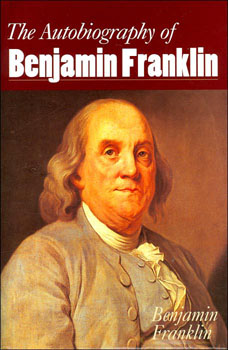The Autobiography Of Benjamin Franklin
|
| updated |
Copy Link Code
|
 The Autobiography of Benjamin Franklin, or as he referred to them, his Memoirs, were written by his own hand intermittently between 1771 and 1790. The book provides us with an intimate view of Franklin's life and struggles. An Autobiography of Benjamin Franklin summary would be that it is based on four separate parts for his early life; his attempts at living virtuously; his return to Philadelphia; and his contributions to American diplomacy. Ben Franklin's autobiography was not published in its full form until almost a century after his death. The first publication was a French translation of only Part One which came out in 1791, a year after his death. Two years after that, an English version was published still missing the three additional parts. It was not until 1818 that William Temple Franklin, Benjamin's grandson, published the first three parts in English and another fifty years after that until a full form was published by John Bigelow. It is apparent by the relatively brief Part Four, ending abruptly, that Benjamin Franklin had intended to continue his autobiography further before his death in 1790.
The Autobiography of Benjamin Franklin, or as he referred to them, his Memoirs, were written by his own hand intermittently between 1771 and 1790. The book provides us with an intimate view of Franklin's life and struggles. An Autobiography of Benjamin Franklin summary would be that it is based on four separate parts for his early life; his attempts at living virtuously; his return to Philadelphia; and his contributions to American diplomacy. Ben Franklin's autobiography was not published in its full form until almost a century after his death. The first publication was a French translation of only Part One which came out in 1791, a year after his death. Two years after that, an English version was published still missing the three additional parts. It was not until 1818 that William Temple Franklin, Benjamin's grandson, published the first three parts in English and another fifty years after that until a full form was published by John Bigelow. It is apparent by the relatively brief Part Four, ending abruptly, that Benjamin Franklin had intended to continue his autobiography further before his death in 1790.
A Ben Franklin autobiography summary must differentiate each part. Part One focuses on the quarrel with his brother James that gave him impetus to leave his hometown of Boston and find work in Philadelphia. It includes his unpleasant trip to London where he was stranded for two years as well as his fortune in business when he returns and his success with The Pennsylvania Gazette. At the end, after describing his common law marriage to Deborah Read in 1730, Franklin notes that his break in writing is due to the oncoming Revolution (he is writing in the early 1770's). The personal nature of Part One, read by only a few friends, prompted letters sent to Franklin demanding he continue the work. Part Two is written while he is in Paris representing American interests and focuses on his list of 13 virtues to live by; Franklin admits that he struggles to reach perfection but it is the effort that makes him a better man. Part Three is much longer, written when he returned to Philadelphia in 1788 and based on the old papers of his that survived the Revolution. In this part, he explains his numerous public developments, innovations and scientific discoveries which made him famous around the world. Part Four, the shortest in the book, explains his diplomatic efforts while representing Pennsylvania and the American colonies in Britain.
For a biography of Benjamin Franklin, there are many options written mainly in the 20th century. Benjamin Franklin biography books include titles such as The First American and Stealing God's Thunder. Benjamin Franklin autobiography analysis as well as anecdotes and criticisms of the Ben Franklin bio appear throughout American literature, including satirical comments from Mark Twain. There is a Benjamin Franklin short biography available at some of the monuments and memorials to him in both Philadelphia and Washington, DC. The Benjamin Franklin bio is an indelible part of our nation's early history; he may not have been President, but his impact was just as relevant as any other Founding Father.
